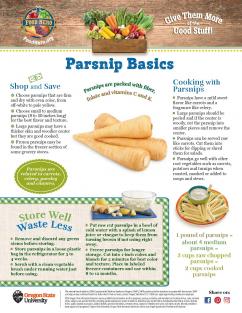Parsnip Basics
Parsnips are packed with fiber, folate and vitamins C and K.
Shop and Save
- Choose parsnips that are firm and dry with even color, from off-white to pale yellow.
- Choose small to medium parsnips (8 to 10 inches long) for the best flavor and texture.
- Large parsnips may have a thicker skin and woodier center but they are good cooked.
- Frozen parsnips may be found in the freezer section of some grocery stores.
Parsnips are related to carrots, celery, parsley and cilantro.
Store Well Waste Less
- Remove and discard any green stems before storing.
- Store parsnips in a loose plastic bag in the refrigerator for 3 to 4 weeks.
- Scrub with a clean vegetable brush under running water just before using.
- Put raw cut parsnips in a bowl of cold water with a splash of lemon juice or vinegar to keep them from turning brown if not using right away.
- Freeze parsnips for longer storage. Cut into 1-inch cubes and blanch for 2 minutes for best color and texture. Place in labeled freezer containers and use within 8 to 12 months.
Cooking with Parsnips
- Parsnips have a mild sweet flavor like carrots and a fragrance like celery.
- Large parsnips should be peeled and if the center is woody, cut the parsnip into smaller pieces and remove the center.
- Parsnips can be served raw like carrots. Cut them into sticks for dipping or shred them for salads.
- Parsnips go well with other root vegetables such as carrots, potatoes and turnips when roasted, mashed or added to soups and stews.
1 pound of parsnips = about 4 medium parsnips = 3 cups raw chopped parsnips = 2 cups cooked parsnips
Enjoy Parsnips
Recipes
Parsnip Soup
Roasted Parsnips
Kids Can!
When kids help make healthy food, they are more likely to try it. Show kids how to:
- scrub parsnips with a clean vegetable brush under running water.
- measure and mix ingredients.
- spread parsnips on a pan for roasting.




